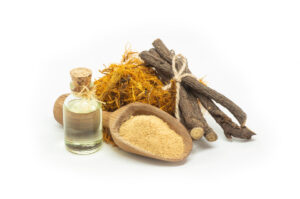
Overview of Medicinal Properties of Licorice Root
Licorice root is a popular herbal remedy that has been used for centuries to treat various ailments. It is derived from the Glycyrrhiza glabra plant and contains many beneficial compounds, such as glycyrrhizin, flavonoids, and saponins. Licorice root has antiviral, anti-inflammatory, and antioxidant properties and can be used to treat digestive problems, respiratory issues, skin conditions, and more. In this article, we will discuss some of the medicinal properties of licorice root as well as how it should be taken safely.
Health Benefits of Licorice Root
One of the most well-known health benefits of licorice root is its ability to help ease digestive issues. It can be used as a natural laxative and antacid, helping to reduce stomach acidity, improve digestion, and relieve constipation. Licorice root may also help protect against ulcers by increasing the protective mucosal lining in the stomach. Additionally, it has been shown to reduce symptoms of nausea and vomiting.
Licorice root can also be used as an expectorant to help clear mucus from the lungs and ease a sore throat or cough. It can help with respiratory conditions such as bronchitis, asthma, and allergies. Additionally, licorice root has anti-inflammatory properties which may help to reduce inflammation and swelling in the airways, making breathing easier.
See my article on home remedies for coughs here.
Licorice root has also been shown to have antioxidant properties which can help protect the body from free radicals that can damage cells and contribute to diseases such as cancer. Additionally, it may be helpful in treating skin conditions like eczema and psoriasis as its anti-inflammatory effects can reduce itching and swelling.
Potential Side Effects
When taking licorice root, it is important to be aware of potential side effects. Consuming too much licorice root can cause high blood pressure, headaches, lethargy, muscle weakness, and water retention. It is also not recommended for people with kidney or liver problems or who are pregnant or breastfeeding. Additionally, it can interact with certain medications such as blood pressure and diabetes medications. It is important to speak to a doctor or medical professional before taking licorice root supplements in order to ensure that it is safe for you.
In general, consuming moderate amounts of licorice root (up to one teaspoon per day) can be beneficial for many people. Those looking to get the most out of their licorice root should look for a supplement that contains at least 4% glycyrrhizin since this is thought to be the active ingredient responsible for its health benefits. Additionally, it is best to consult with a medical professional before taking any type of herbal supplement in order to ensure that it is safe for you and will not interfere with any existing medications.
Nutritional Value of Licorice Root
Licorice root is a great source of many essential vitamins and minerals, making it a nutrient-dense food. It is rich in magnesium, potassium, calcium, zinc, iron, manganese, selenium, and copper. It also contains antioxidant vitamins such as Vitamin A and Vitamin C. In terms of fiber content, licorice root contains both soluble and insoluble fiber, which can help with digestion and overall health.
Lastly, licorice root is low in sugar and calories, meaning that it can be consumed without worrying about weight gain or blood sugar levels. This makes it an excellent choice for those looking to get the most out of their dietary intake. Licorice root can also be used as a sweetener.
How to Use Licorice Root for Improved Wellness
Licorice root can be consumed in a variety of ways. It can be added to foods as a seasoning or flavoring agent, such as in teas, smoothies, soups, and other dishes. It can also be taken as a supplement in pill form or mixed with water for drinking. Additionally, an ointment made from licorice root extract can be applied topically to the skin for relief of itching and inflammation
When used properly, licorice root is a safe and effective way to promote overall wellness and vitality. With its variety of vitamins, minerals, fiber, and other beneficial compounds, it’s no wonder that licorice root has become such a popular herb
Recipes Utilizing Licorice Root as an Ingredient
There are many delicious recipes that incorporate licorice root as an ingredient. Here are just a few to get you started:
• Licorice-infused Granola Bars – A combination of oats, nuts, seeds, honey and licorice root make for the perfect grab-and-go snack.
• Licorice-Spiced Chai Tea – A delicious blend of black tea, spices, and licorice root for a comforting and flavorful beverage.
• Licorice Root Pudding – Creamy coconut milk pudding sweetened with honey and flavored with licorice root is the perfect guilt-free treat.
• Licorice Root Cocktail – Enjoy this refreshing and herbal cocktail made with vodka, licorice root syrup, lime juice, and mint.
No matter how you choose to enjoy it, licorice root is a tasty and healthy way to boost your overall health. With its many beneficial compounds and delicious flavor, it’s easy to see why licorice root has become such a popular wellness ingredient
Conclusion
Licorice root is a powerful and tasty herb that packs many beneficial compounds. Whether you choose to take it as a supplement, add it to your meals, or use an ointment topically on the skin, licorice root is a great way to promote overall health and wellness. With its delicious flavor and versatile uses in dishes and drinks, it’s no wonder that licorice root has become such a popular choice. Give it a try and see for yourself!
Note: This content is for informational purposes only and should not be considered medical advice. As always, consult with your healthcare provider before taking any herb or making any changes to your diet.
Sources for Further Research on the Medicinal Properties of Licorice root
https://www.ncbi.nlm.nih.gov/pmc/articles/PMC8705998/
• WebMD – Information on the Health Benefits of Licorice Root
• The Ohio State University Extension – An Overview of the History and Uses of Licorice Root
• Healthline.com – A Comprehensive Guide to the Health Benefits of Licorice Root
• International Journal of Molecular Sciences – Research on the Potential Uses for Licorice Root in Human Health
• NCBI – Research on the Potential Anti-Obesity Effects of Licorice Root Extracts
• Health Focus International – A Review of the Medicinal Uses of Licorice Root
• American Botanical Council – An Overview of the History, Uses, and Benefits of Licorice Root

